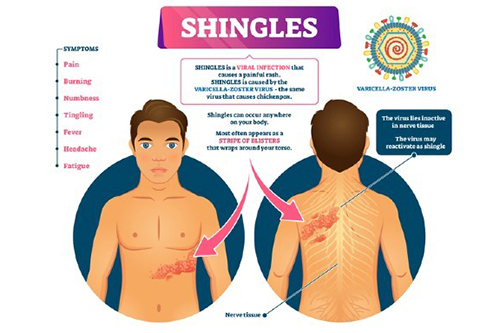Researchers Call For Patients Required For Study To Stop Long-term Pain From Shingles
Patients with newly diagnosed shingles are already taking part in the largest trial of its type in the world but even more patients are needed to help. The study, being run by the University of Bristol and funded by the National Institute for Health and Care Research (NIHR), wants to find out if the long-term pain caused by shingles that commonly persists after the rash has healed can be prevented.
About one in three people get shingles, which causes a painful rash. People with shingles should be seen by their GP as soon as possible, ideally within three days. The rash goes after a few weeks, but the nerve pain can last for months or even years. This is called “post-herpetic neuralgia”, it is difficult to treat and currently unpreventable.
Doctors and researchers at the universities of Bristol, Oxford, Southampton and Warwick want to find out if taking a tablet called amitriptyline can prevent persistent pain.
The study, called Amitriptyline for the prevention of post-herpetic neuralgia (ATHENA), will recruit 846 patients aged 50 and over with newly diagnosed shingles via participating GP surgeries. GP surgeries taking part are in the West of England, Wessex, Thames Valley and South Midlands, North West London, South West Peninsula, North West Coast, Greater Manchester, Yorkshire and Humber, Kent, Surrey and Sussex and West Midlands.
Everyone taking part will take tablets daily for ten weeks: half will be given amitriptyline and the other half will get placebo (or “dummy”) tablets. During the following 12 months, participants will be asked to complete regular questionnaires to find out what happens.
Doctors have prescribed amitriptyline since the 1960s to treat depression. Originally it was used at high doses (75-150 mg) but nowadays it is used at low dose (10-30 mg) to treat nerve pain. In this study, the researchers are trying to find out whether low dose amitriptyline can prevent the nerve pain caused by shingles.
Matthew Ridd, GP and Professor of Primary Health Care at the University of Bristol’s Centre for Academic Primary Care, said: “It will be a really exciting and important development if our research shows taking amitriptyline tablets stops long term pain from shingles. However, to confirm if starting the medication early on does help we need many more newly diagnosed shingles patients to take part. By taking part you could help improve the treatment for people with shingles in the future.”
Hazel Everitt, GP and Professor of Primary Medical Care at University of Southampton, added: “Shingles is common and we currently don’t have any treatments that prevent the persistent pain that can last for a long time afterwards and be really troublesome. Common painkillers often don’t help and we need to seek new ways to prevent it.”
Lorelei Hunt, a patient with lived experience of post-herpetic neuralgia who is part of the research team, added: “We need more people to help find out if we can prevent this nasty sting in the tail of shingles. We only have one chance to do this trial, so if you get shingles and your surgery is taking part, please sign up.”

